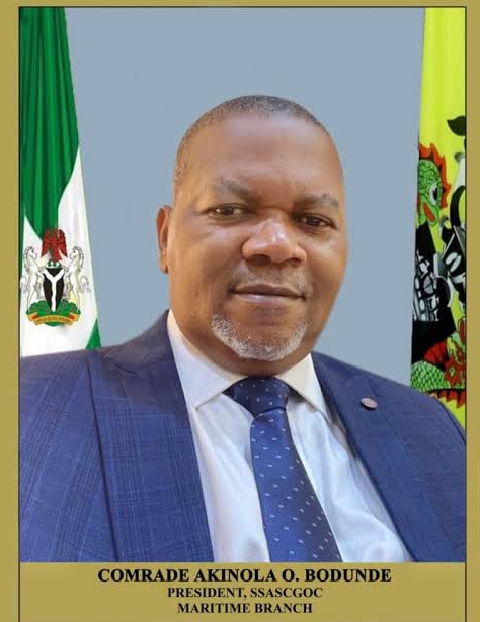The Nigerian Ports Authority (NPA) is grappling with exorbitant energy costs, spending an estimated N50 million monthly on diesel to power generators at the Tin Can Island Port alone.
President of the Senior Staff Association of Statutory Corporations and Government Owned Companies (SSASCGOC), Maritime branch, Comrade Akin Bodunde gave this revelation while speakng with journalists on Thursday in Port Harcourt on the sidelines of the Maritime Workers Union of Nigeria (MWUN) 6th branch Quadrennial
Delegates’ Conference.
His words, “There is no port that is not running on generator 24 hours. Every generator you have in the port consumes more than 200 or 400 liters of diesel a day. And when you have three or four generators in different locations, you know what that means.”
According to him, Tin Can Island port alone consumes over 33,000 liters of diesel monthly, translating to about N50 million.
“Apapa port for example is in one area, but Tin Can port is big. From Tin Can to Kirikiri 1, Kirikiri 2, to Ikorodu Terminal, and even to some along Mile 2,, they are all been run by generator.
“Tin Can port alone consumes more than 33,000 litres of diesel on a monthly basis, which is about N50 million monthly, ” he said.
While acknowledging that port concessioning has improved revenue for the NPA by reducing its infrastructure burden, Bodunde lamented that the 50 percent deduction of NPA’s gross internally generated revenue is significantly impacting its finances, especially given the persistent operational challenges like power.
Speaking on the delay in the renewal of the port concession licenses of terminal operators at the nation’s seaports, Bodunde urged the government not to renew the licenses of non-performing operators.
“I don’t want to mention their names but the NPA management knows them, and I know the power behind all of them. But we know the ones that are performing.
“There are a lot of political issues attached to it, and I know the government is looking at it, because if you know Nigeria, the people behind these processionaires are not just people you can push away overnight.
“But I know there are a lot of committees set up to look at their activities and performance. If they use that yardstick, automatically we should be able to remove the bad ones and work with the good ones.
“When you go to Lekki port, when you see the facilities there, you can’t compare it with Apapa. And when you go to PTML, you can’t compare it with our old port like the one at Tin Can, that was built in 1976,” he said.
Bodunde also criticized the port concession for its failure to create substantial direct employment despite initial promise of generating about 500,000 jobs.
He claimed that the total number of direct employees on the payroll of all terminal operators nationwide is less than 2,000, excluding dockworkers who are employed by separate companies.
Speaking on employment and staff strength within the NPA, Bodunde said there have been regular recruitment since 2013, with new hires in 2016, 2018, 2020, and 2023.
However, he explained that the apparent reduction in staff numbers is due to internal career progression.
“There was recruitment in 2013, there was one in 2016, there was one in 2018, there was employment in 2020 and also in 2023. But the issue is this, if you employ somebody as a staff, in the next five years, he will become an officer. Nobody wants to remain in a particular place for too long . Even some of the people they employ as staff already have Ordinary National Diplomas (OND).
“And when you have OND, you go for Higher National Diploma, in the next three years, you are through. The next thing you apply for upgrading, and NPA with promote you. That’s why the number of staff are reducing because people want to move to officer cadre.
“The last employment exercise, they employ about 250 or there about. But today, the majority of them are officers It’s not that NPA is not employing, it’s just that people have to advance in their careers, ” he said.
Bodunde suggested that the NPA might consider a system of severance packages, similar to those in the Central Bank of Nigeria (CBN) and NIMASA, to manage the staff structure more efficiently and reduce the burden of a top-heavy workforce.
He stated that the NPA promotion policy is currently under review for potential amendments.
“The top is still heavy and there is need for more junior officers because people are moving. The only thing is if NPA have a system of easing them out by making provision for other allowances, as it is done in CBN and it happened in NIMASA some years ago such that when you get to the level you want to go, they give you a severance package If management do that, maybe it will reduce the load because the top is heavy.
And that is why we are looking at the promotion policy to see how we can re-amend it, ” he said.





More to read
Tin Can Customs adopts trade enabler mantra, posts record N145. 9bn revenue in January
Relief for agents as Customs reverses N10m license fee hike following ANLCA intervention
NSW committee launches end user training, urges stakeholders to participate